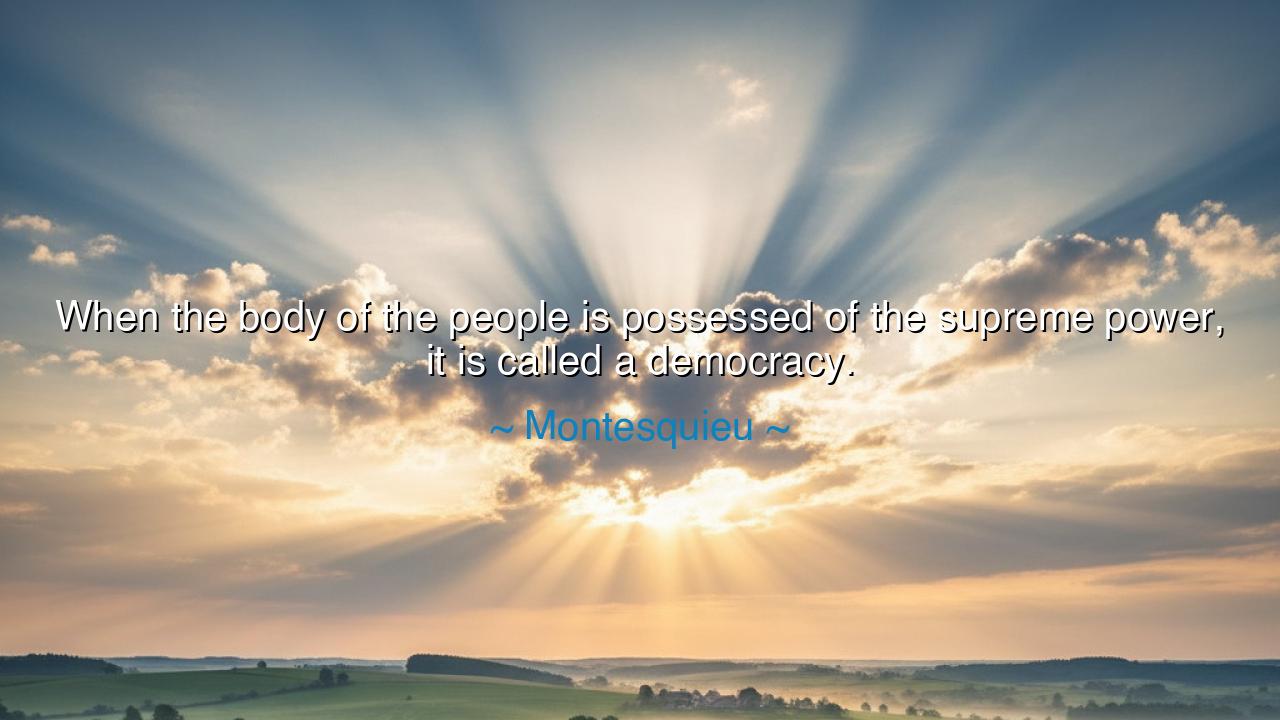
When the body of the people is possessed of the supreme power
When the body of the people is possessed of the supreme power, it is called a democracy.






The words of Montesquieu, “When the body of the people is possessed of the supreme power, it is called a democracy,” carry the weight of eternal truth. They remind us that the highest throne is not carved for one king, nor for a few nobles, but is shared among the many. In a democracy, sovereignty does not dwell in palaces but in the collective will of the people, who together hold the fate of the nation in their hands.
The ancients knew this truth well. In the city of Athens, long before Montesquieu’s age, the citizens gathered in the assembly, raising their voices to shape laws and guide their destiny. Though imperfect and limited to a few, it was the dawn of the great experiment in freedom—the recognition that the supreme power belongs not by divine right to a ruler, but by natural right to the people themselves. From this seed grew the idea that liberty is safeguarded when all share in the power of governance.
Yet Montesquieu, the wise philosopher of the Enlightenment, uttered these words not as mere praise, but as instruction. He saw that when the body of the people governs, balance must be kept, for power can corrupt even the many as it does the few. The spirit of democracy must be guarded with laws, with virtue, and with vigilance, lest it be twisted into tyranny by the majority itself. Thus, his teaching is both exaltation and warning: democracy is the noblest form of government, but it must be guided by justice to endure.
Consider the story of the American Revolution. A people, weary of kings and distant parliaments, declared that the supreme power should rest in their own hands. They formed a republic where leaders would be chosen not by bloodline, but by consent. Their bold act gave birth to a new nation, proving Montesquieu’s wisdom: when the people claim their rightful sovereignty, they can cast off tyranny and create a world where liberty may flourish.
So let this wisdom echo across the ages: the supreme power of a nation lies not in crowns or armies, but in the hearts and voices of its people. This is the essence of democracy—a covenant of shared power, a chorus of many voices rising as one. Guard it well, children of tomorrow, for it is both fragile and mighty, the brightest flame of freedom and the surest shield against oppression.






FIfafaf iaiafafsaf
Montesquieu’s perspective on democracy highlights the ideal of people-powered governance. But what happens when the system becomes so complex that ordinary people struggle to engage with it? In a world dominated by information overload and complex political structures, how do we ensure that the ‘body of the people’ can still exercise their power meaningfully? Can we redesign systems to make democracy more accessible and reflective of the people’s true will?
TTTung Thanh
It’s interesting to think about Montesquieu’s take on democracy. If we follow his definition, democracy should be a system where the people hold all the power. But in today’s world, can we honestly say that the people control everything? With the rise of lobbying, political parties, and mass media, does the 'body of the people' truly have supreme power, or has that power been shifted away? How do we reclaim that control?
DDDinh Dongvan
Montesquieu’s definition of democracy seems simple, yet it raises the question of whether democracy as we know it today actually empowers the people. Does the political system we have today truly represent the will of the majority, or are we simply electing officials who are influenced by money and power? How do we make sure that the power remains truly in the hands of the people and not in the hands of those who can manipulate the system?
TTThao Nguyen Thi Thanh
This quote emphasizes that democracy is defined by the people's control, but in practice, can we say that modern democracies always reflect this ideal? In many cases, do we see genuine power in the hands of the people, or is it diluted by corporate influence, media, or special interest groups? What do you think needs to change for democracy to truly represent the voice of the people?
TTLai Thi Tam
Montesquieu’s quote about democracy raises an important question about the true nature of power. Is democracy truly the power of the people, or is it often manipulated by elites, even when it appears that the masses hold the authority? How can we ensure that the people’s will remains the central guiding force, especially when financial interests or political corruption may skew democratic processes?